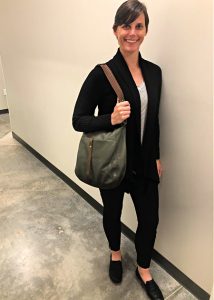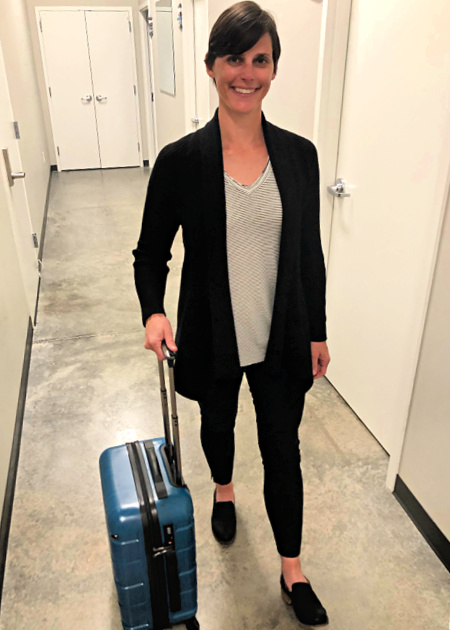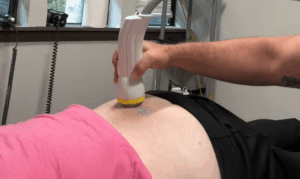SPONSORED FEATURE
That pain in the neck you’re feeling? It could be caused by your purse. The back pain that’s got you sidelined? Also potentially caused by your purse or by luggage or other heavy items you’re carrying daily.
As we travel and prepare to celebrate during the holiday season, the opportunity for pain and injuries resulting from improperly lifting or carrying things increases. It’s enough to make the “most wonderful time of the year,” well, not so awesome.
Knowing the best way to handle your bags can go a long way toward preventing pain and even injury not only during the holidays but year-round, according to Dr. Karyn Staples, physical therapist and owner of ProHealth Physical Therapy and Pilates Studio in Peachtree City.
One of the best things we can do, whenever possible, is to lighten the load.
“It’s a cumulative process,” Karyn says. “Carrying a heavy bag one time may not have long-term effects, but over time, your body adjusts to certain loads, and this can start to cause a change in alignment.”
Living in an area where so many people travel for a living, ProHealth provides physical therapy and Pilates regimens for many pilots, flight attendants, and other professionals associated with the airline industry through physical therapy and Pilates. As many as one in five clients who come to ProHealth need relief from shoulder, neck, or back pain that may be associated with improperly carrying handbags or luggage, according to Dr. Staples. Lower back pain, Dr. Staples says, is their most common complaint.
Dr. Staples offers several suggestions for alleviating and preventing pain associated with the bags you carry.
Lighten the Load

Pain associated with carrying a heavy purse is so common, a Canadian chiropractor gave it a name: Heavy Purse Syndrome. Karyn agrees, “it’s a thing,” and says the most your purse should weigh is eight pounds.
When the handbag you carry weighs more than eight pounds, it’s time to offload anything you’re carrying that you don’t need today. The ounces from coins in your wallet add up to a pound faster than you may think.
Similar to your purse, the best way to manage the weight of your luggage is to pack light. Ask yourself, “do I really need this” before it goes in the suitcase. Is it essential to this trip? If not, leave it behind.
Once you’re at the airport, Karyn recommends taking advantage of luggage carts and checking your bag when possible. Not only does this alleviate much of the weight-related stress of carrying bags through the airport, but it may prevent falls and other mishaps along the way. Tripping over your own luggage is a thing, too, Karyn confirms.
“People are generally anxious with travel and get distracted as to where their items might be,” Karyn says. “Check your bag if you can to avoid having another item to watch out for. If that is not an option, then pack light.”
Choose and Carry Bags Wisely

Are there right and wrong ways to carry your bags? Yes, Karyn says.
“Right allows the body to stay aligned. Wrong brings the body out of good symmetrical alignment.”
When it comes to your purse, the type of bag you carry and how you position it on the body are important. Karyn prefers a crossbody purse, which allows a more even distribution of weight across the body and naturally balances the load. Particularly if you experience pain in the neck area, lightening the load of the purse and trying a crossbody strap can help.
However, a shoulder bag or tote works as long as the strap and your body are aligned properly. If you will be carrying a purse all day, she recommends a handbag about the size of a book.

For luggage, Karyn prefers the four-wheeled roller bags because you can keep them upright and at your side rather than rolling them behind, putting additional strain on the shoulders and back.
The height and position of the handle are also important. The proper way to carry your luggage is with your arm at the side and the bag’s handle properly fitted for your height.
“Having to lean to the side because the handle is too short or carrying a heavy bag on one side can cause alignment issues,” she says.
Stow Carry-ons Safely
When it’s time to put your carry-on in the overhead bin, Karyn offers best practices for this activity, too.
Begin by keeping your bag close to your body and placing one foot in front of the other. As you step forward, shift the weight toward the front foot as you bring the bag up toward the overhead compartment. When you retrieve your carry-on, shift your weight toward the back foot as you bring the bag close to your body again.
Be sure to keep your pelvis, ribcage and shoulders stacked upright on top of each other so that the shift of the weight is forward or back.
How you breathe while lifting is important too. As you lift something, breathe out. When you bring it back toward your body, inhale.
If you are experiencing neck, shoulder, or back pain, the team at ProHealth Physical Therapy and Pilates Studio is ready to help. For an appointment for physical therapy, call 770-487-1931.
If Pilates exercise is something you would like to explore, private lessons and classes are available throughout the week at ProHealth. Call or visit https://prohealthga.com/schedule.
About ProHealth Physical Therapy and Pilates Studio
ProHealth Physical Therapy and Pilates Studio was founded in 2005 by Dr. Karyn Staples, PT, PhD, NCPT. She leads a staff of more than a dozen physical therapists, Pilates teachers, and office support staff in providing effective research-based therapies and exercise.













Leave a Comment
You must be logged in to post a comment.